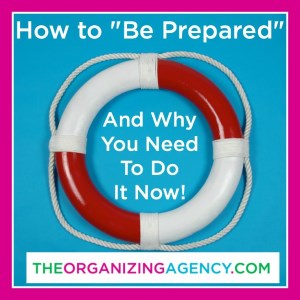How To “Be Prepared” And Why You Need To Do It Now!
When the power goes out, aren’t you amazed by how quickly the inconvenience can become truly life disrupting? What if the return of your electricity or clean water supply was uncertain? How long would you last at home with the resources available to you and your family?
 What does it mean to be prepared?
What does it mean to be prepared?
Although no one wants to incite undue fear in their children, it is important to sit down with your family to discuss the potential crisis scenarios that may arise, and what they should do in such circumstances. Form a plan in advance, because chances are that your family will not all be together when a catastrophe occurs. Review with your family the travel routes to and from school and home, and make sure there is an agreed upon alternative to follow, in case the major roads are blocked during an emergency. Discuss how you will contact each other if cell service is down, where are the designated “safe places” in your community, and how you will all reconvene safely.
The more advanced research and planning you do, the better prepared you and your family will be to reunite safely during an emergency. Inquire about emergency plans at work, school, and after-school programs, or anywhere your family regularly spends time. Even if you’re all together at home when disaster strikes, you may lose access to water, electricity and food supplies for a prolonged period of time. Take steps now to stock your home and office with the right supplies, follow the CDC approved guidelines on food storage, and replace or rotate your stored food on a regular basis.
Best Tips for Maximum Preparedness
- Identify Your Risk
Have a look at the hazards that surround you at home, work or school. Use available neighborhood disaster plans to walk through the potential scenarios you may find yourself in.
- Learn CPR and First Aid
Take the family to train together in these most important and potentially life-saving skills. Find information on classes through your local American Red Cross chapter.
- Create a Family Emergency Plan
Devise a family plan that covers everything from basic emergency contact information and where to meet in case of evacuation, to how to handle special circumstances such as gathering pets or tending to special medical needs.
- Practice Executing Your Plan
Now that you have a plan, make sure it works by practicing! Spend an afternoon running through the steps so you’re confident that your family will respond well in case of disaster.
- Build Emergency Supply Kits for Your Home, Office and Vehicle
Read our previous Preparedness post for basic guidelines on what to store and for how long. You can also get comprehensive checklists for gathering emergency supplies at Ready.gov.
- Don’t Forget Those with Special Needs
Make sure that your Emergency Kits include supplies for infants or seniors, as needed. Medications, diapers, extra blankets, and other unique provisions must be considered.
- Talk to Your Children
The best thing you can do to prepare your family is to talk to them. Explain to your kids what possible risks they face and make sure they know how to behave under these stressful circumstances. If the worst does happen, having talked it through with you will make it more likely that your children will stay calm and do what they need to do to get home to safely.
Take the time to become familiar with everything you and your family need to know to ride out even the most inconvenient of potential disasters, and hopefully you will never have to put that knowledge to use.
What do you think is the single most important thing you can do to be prepared? Have you ever been caught in a crisis without being prepared? Share your story below and let our readers benefit from your experience, so that they can be better prepared for whatever may come.

